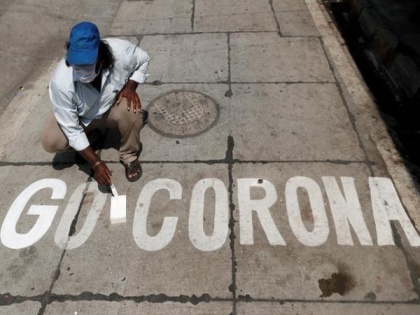Combating COVID-19: States, UTs take initiatives at Panchayat level
By ANI | Published: March 31, 2020 07:21 PM2020-03-31T19:21:13+5:302020-03-31T19:35:02+5:30
As part of efforts to contain the spread of coronavirus, states and Union Territories have taken several steps at the panchayat level including setting up of isolation wards, laying thrust on social distancing and increased sanitation of public places.

Combating COVID-19: States, UTs take initiatives at Panchayat level
New Delhi [India], Mar 31 : As part of efforts to contain the spread of coronavirus, states and Union Territories have taken several steps at the panchayat level including setting up of isolation wards, laying thrust on social distancing and increased station of public places.
India has reported 1,251 cases of coronavirus so far, including 32 deaths.
In Jharkhand, wall paintings on 'Do's and Don'ts' have been put up. Isolation wards have also been set up to treat migrants in Gram Panchayats. Also, face masks have been distributed at Gram Panchayat level.
In Andaman and Nicobar Islands, essential supplementary foods have been supplied to people with assistance from anganwadi workers in Namunaghar Gram Panchayat. All the villagers in Namunaghar Gram Panchayat have been informed to maintain social distancing in the premises of the Panchayat while doing purchases for essential goods.
In Gorakhpur of Uttar Pradesh, 'swachhta kits' are being provided to all Vantangiya and Musahar population and to persons in isolation centres in gram panchayat level. Each kit contains three triple layer masks, two antiseptic soaps, one bottle of 200 ml stiser and pamphlets of Jaagrukta Samagri.
All district authorities in the state have been informed and guidelines have been issued regarding steps to be taken during lockdown under COVID-19. Identification of people coming from outside Uttar Pradesh and abroad after March 15 is being done through a dedicated portal (www.hamaripanchayat.up.gov.in).
Also, regular status of health and keeping the suspects in isolation at their homes or Panchayat Bhawans or schools is being done. All station workers have been instructed to spray sodium hypochlorite and perform fogging on regular basis in vulnerable areas.
In Himachal Pradesh, 46 Self Help Groups (SHGs) have been formed under the Rural Development and Panchayati Raj department, which are contributing to prevent COVID-19 by making three-layer masks. So far, about 32,000 masks have been manufactured and sold to rural local bodies, police department, IPH department and other departments.
In West Bengal, ward members/SHGs are being involved in the making of stisers and masks which are distributed in the Panchayats. Also, mobile vehicles under Community Area Development Program (CADP) are being used to sell vegetables, fish and fruits which are produced by the SHGs. The Gram Sansad Committee members are also ensuring that all the migrant workers are housed in makeshift facilities.
A control room of 15 people has been set up in Madhya Pradesh to monitor the status on time to time basis. Real-time information on migrants is also being done.
Instructions have been passed on stising villages in all Gram Panchayats in Punjab. The Sarpanch of every village is utilising Rs 5,000 from Panchayat Fund every day for fighting coronavirus.
Fumigation has been completed in more than 80 per cent of the villages in the state. The SHGs are also involved in producing masks.
In Punjab, information is being shared through Facebook and Twitter pages on where the free medical camps are being orgsed. Also, awareness being spread through announcements via loudspeakers at 5 am and 5 pm at gurdwaras and temples on free medical camps.
In Nagaland, village-level intensive stisation exercises are being done in many places, while SHGs in Teinyaker and Telongjem of Longjemdang village are providing masks and free soaps.
A kilo of masoor dal, rice and fermented fish is being distributed to Gram Panchayat residents in Mpur.
Special Gram Sabha was conducted in Gram Panchayats adjoining India-Nepal border in Sikkim. Village level committees have also been formed comprising Panchayat officials, police, ASHA, AWW and health workers to identify the suspected cases and spread awareness. Only vehicles with special pass or emergency vehicles are allowed for movement in the state.
In Tripura, directions have been issued by the government for creating public awareness for COVID-2019 and to avoid training/meetings which require mass public gathering. Stisation is being done in all public gathering places including bus terminals and shopping malls.
Moreover, directions were issued for closing borders in consultation with the Bangladesh government. Shifting of local markets to more open places such as football ground, cricket ground is being done in order to maintain social distancing.
In Rajasthan, permission for utilisation of Rs 6 lakh per MLA from MLALAD fund for check-up, training and purchase of other required instruments are done. The spraying of stisers also at Gram Panchayat and Block level is being done with monitoring of activity at state level.
Maintenance of record (name, mobile number, date of homecoming and health status) of the people coming from other states is being done in Uttarakhand. Gram Panchayat officers are spreading awareness on social distancing.
The Gram Panchayat Pradhans and Secretary are in regular touch with outsiders and apprising people for health check-ups. Spraying of stisers at Gram Panchayat level in being done.
Meanwhile, in Maharashtra, awareness is being spread to Gram Panchayat functionaries to both Sarpanch and Gram Sevaks through calls from the block level.
The functionaries are in regular touch on who are relocating back to Gram Panchayat and also aware them on health check-ups. They are also maintaining records of the people coming from other states.
( With inputs from ANI )
Open in app